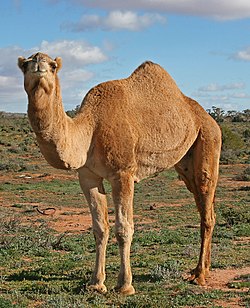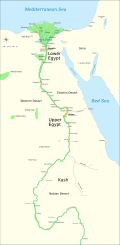Portal:Africa



Africa is the world's second-largest and second-most populous continent after Asia. At about 30.3 million km2 (11.7 million square miles) including adjacent islands, it covers 20% of Earth's land area and 6% of its total surface area. With nearly 1.4 billion people as of 2021, it accounts for about 18% of the world's human population. Africa's population is the youngest among all the continents; the median age in 2012 was 19.7, when the worldwide median age was 30.4. Based on 2024 projections, Africa's population will exceed 3.8 billion people by 2100. Africa is the least wealthy inhabited continent per capita and second-least wealthy by total wealth, ahead of Oceania. Scholars have attributed this to different factors including geography, climate, corruption, colonialism, the Cold War, and neocolonialism. Despite this low concentration of wealth, recent economic expansion and a large and young population make Africa an important economic market in the broader global context, and Africa has a large quantity of natural resources.
Africa is highly biodiverse; it is the continent with the largest number of megafauna species, as it was least affected by the extinction of the Pleistocene megafauna. However, Africa is also heavily affected by a wide range of environmental issues, including desertification, deforestation, water scarcity, and pollution. These entrenched environmental concerns are expected to worsen as climate change impacts Africa. The UN Intergovernmental Panel on Climate Change has identified Africa as the continent most vulnerable to climate change.
The history of Africa is long, complex, and varied, and has often been under-appreciated by the global historical community. In African societies the oral word is revered, and they have generally recorded their history via oral tradition, which has led anthropologists to term them "oral civilisations", contrasted with "literate civilisations" which pride the written word. African culture is rich and diverse both within and between the continent's regions, encompassing art, cuisine, music and dance, religion, and dress.
Africa, particularly Eastern Africa, is widely accepted to be the place of origin of humans and the Hominidae clade, also known as the great apes. The earliest hominids and their ancestors have been dated to around 7 million years ago, and Homo sapiens (modern human) are believed to have originated in Africa 350,000 to 260,000 years ago. In the 4th and 3rd millennia BCE Ancient Egypt, Kerma, Punt, and the Tichitt Tradition emerged in North, East and West Africa, while from 3000 BCE to 500 CE the Bantu expansion swept from modern-day Cameroon through Central, East, and Southern Africa, displacing or absorbing groups such as the Khoisan and Pygmies. Some African empires include Wagadu, Mali, Songhai, Sokoto, Ife, Benin, Asante, the Fatimids, Almoravids, Almohads, Ayyubids, Mamluks, Kongo, Mwene Muji, Luba, Lunda, Kitara, Aksum, Ethiopia, Adal, Ajuran, Kilwa, Sakalava, Imerina, Maravi, Mutapa, Rozvi, Mthwakazi, and Zulu. Despite the predominance of states, many societies were heterarchical and stateless. Slave trades created various diasporas, especially in the Americas. From the late 19th century to early 20th century, driven by the Second Industrial Revolution, most of Africa was rapidly conquered and colonised by European nations, save for Ethiopia and Liberia. European rule had significant impacts on Africa's societies, and colonies were maintained for the purpose of economic exploitation and extraction of natural resources. Most present states emerged from a process of decolonisation following World War II, and established the Organisation of African Unity in 1963, the predecessor to the African Union. The nascent countries decided to keep their colonial borders, with traditional power structures used in governance to varying degrees. (Full article...)
Selected article –

The involvement of the British Colony of Kenya in World War II (Swahili: Vita vya Pili vya Dunia) began with the declaration of war on Nazi Germany by the British Empire in September 1939.
Though some fighting with Italian troops occurred in Kenya itself from June 1940 to February 1941, it remained an important economic asset for the Allies and also contributed a significant number of soldiers to fight in the British Army. (Full article...)
Featured pictures –
Did you know (auto-generated) -

- ... that Rachel Belden Brooks was an African-American pioneer who was awarded $1,000 when she sued the estate of her previous enslaver?
- ... that Ngiam Tong Dow negotiated Singapore's first and largest purchase of gold from South Africa in 1968 by comparing two halves of a United States one-dollar bill?
- ... that Albert Luthuli was the first African to win the Nobel Peace Prize?
- ... that The Red Moon was the first Broadway show to depict alliances between African Americans and Native Americans?
- ... that the Enterprise, a black newspaper in Omaha, supported a separate African American department at the 1898 Trans-Mississippi Exposition?
- ... that Their Highest Potential shows the positive side of segregated schools, as written by a student who was taught in one?
Categories
Selected biography –
Barack Hussein Obama Sr. (/ˈbærək huːˈseɪn oʊˈbɑːmə/; born Baraka Obama, 18 June 1934 – 24 November 1982) was a Kenyan senior governmental economist and the father of Barack Obama, the 44th president of the United States. He is a central figure of his son's memoir, Dreams from My Father (1995). Obama married in 1954 and had two children with his first wife, Kezia. He was selected for a special program to attend college in the United States and studied at the University of Hawaii where he met Stanley Ann Dunham, whom he married in 1961 following the conception of his son, Barack. Obama and Dunham divorced three years later. Obama then went to Harvard University for graduate school, where he earned an M.A. in economics, and returned to Kenya in 1964. He saw his son Barack once more, when his son was about 10.
In late 1964, Obama Sr. married Ruth Beatrice Baker, a Jewish-American woman he had met in Massachusetts. They had two sons together before separating in 1971 and divorcing in 1973. Obama first worked for an oil company, before beginning work as an economist with the Kenyan Ministry of Transport. He was promoted to senior economic analyst in the Ministry of Finance. He was among a cadre of young Kenyan men who had been educated in the West in a program supported by Tom Mboya. Obama Sr. had conflicts with Kenyan president Jomo Kenyatta, which adversely affected his career. He was fired and blacklisted in Kenya, finding it nearly impossible to get a job. Obama Sr. was involved in three serious car accidents during his final years; he died as a result of the last one in 1982. (Full article...)
Selected country –
 |
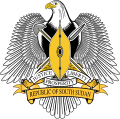 |
|
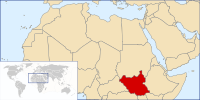
| ||
South Sudan (/suːˈdɑːn, -ˈdæn/), officially known as the Republic of South Sudan, is a landlocked country in East-Central Africa. It is bordered to the east by Ethiopia, to the north by Sudan, to the west by the Central African Republic, to the southwest by Democratic Republic of the Congo, to the south by Uganda and to the southeast by Kenya.
It gained independence from the Republic of the Sudan in 2011, making it the most recent sovereign state or country with widespread recognition. Its capital and largest city is Juba. It includes the vast swamp region of the Sudd, formed by the White Nile and known locally as the Bahr al Jabal meaning "Mountain River". Sudan was occupied by Egypt under the Muhammad Ali dynasty and was governed as an Anglo-Egyptian condominium until Sudanese independence in 1956. Following the First Sudanese Civil War, the Southern Sudan Autonomous Region was formed in 1972 and lasted until 1983. A second Sudanese civil war soon broke out, ending in 2005 with the Comprehensive Peace Agreement. Later that year, southern autonomy was restored when an Autonomous Government of Southern Sudan was formed. South Sudan became an independent state on 9 July 2011, following 98.83% support for independence in a January 2011 referendum.
Selected city –
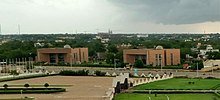
N'Djamena (English: /əndʒɑːˈmeɪnə/ ⓘ ən-jah-MAY-nə) is the capital and largest city of Chad. It is also a special statute region, divided into 10 districts or arrondissements, similar to the city of Paris.
The city serves as the centre of economic activity in Chad. Meat, fish and cotton processing are the chief industries, and it is a regional market for livestock, salt, dates, and grains. (Full article...)
In the news
- 29 March 2025 – Gaza war protests
- Security forces open fire at a pro-Palestine march, organized by the Islamic Movement of Nigeria, in Abuja, Nigeria, killing five people and arresting 19 more. A policeman is killed in the subsequent clashes. (AP)
- 28 March 2025 –
- Russian authorities say that yesterday's sinking of the Sindbad submarine in Hurghada, Egypt, killing six Russians, happened during boarding and not due to a collision as reported. (The National)
- 27 March 2025 – Haitian crisis
- A Kenyan police officer deployed in Haiti as part of the Multinational Security Support Mission is killed in a suspected gang ambush, according to Haitian authorities. Kenya has confirmed that the officer is missing but has not yet verified his death. (BBC News)
- 27 March 2025 –
- At least six people are killed and 39 others are rescued after a Sindbad submarine carrying Russian tourists sinks off the Red Sea coast of Hurghada, Egypt. (BBC News)
- South Sudanese vice president Riek Machar is detained by security forces following an arrest warrant on "unclear charges", according to his spokesperson. The Sudan People's Liberation Movement-in-Opposition says Machar's arrest has effectively ended the 2018 peace agreement which ended the civil war. (Sky News)
- 26 March 2025 – Sudanese civil war
- Battle of Khartoum
Updated: 5:05, 31 March 2025
General images -
Africa topics
More did you know –

- ...that the 1459 Fra Mauro map (pictured) reports that "a junk from India" rounded the Cape of Good Hope in 1420, around 70 years before the navigations of Vasco da Gama?
- ...that the 1998 Sudan famine was caused by human rights abuses in the midst of the Second Sudanese Civil War?
- ...that a smokie is a West African delicacy made by blowtorching the carcass of a sheep or goat without removing its fleece?
- ...that Anne-Marie Nzié, a Cameroonian bikutsi singer, dedicated the song Liberté to President Paul Biya and his party, the Cameroon People's Democratic Movement?
Related portals
Major Religions in Africa
North Africa
West Africa
Central Africa
East Africa
Southern Africa
Associated Wikimedia
The following Wikimedia Foundation sister projects provide more on this subject:
-
Commons
Free media repository -
Wikibooks
Free textbooks and manuals -
Wikidata
Free knowledge base -
Wikinews
Free-content news -
Wikiquote
Collection of quotations -
Wikisource
Free-content library -
Wikispecies
Directory of species -
Wikiversity
Free learning tools -
Wikivoyage
Free travel guide -
Wiktionary
Dictionary and thesaurus


